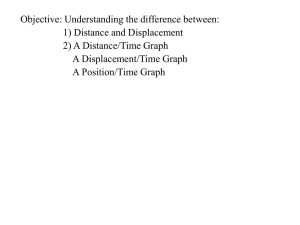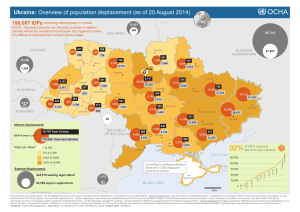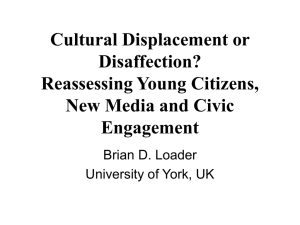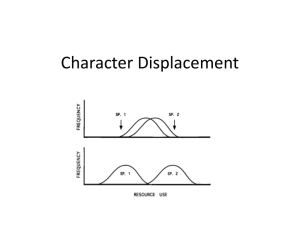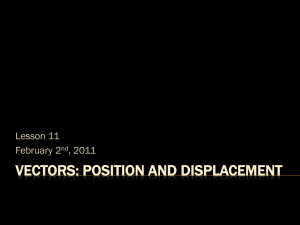Technological innovations in crime prevention global perspectives
advertisement
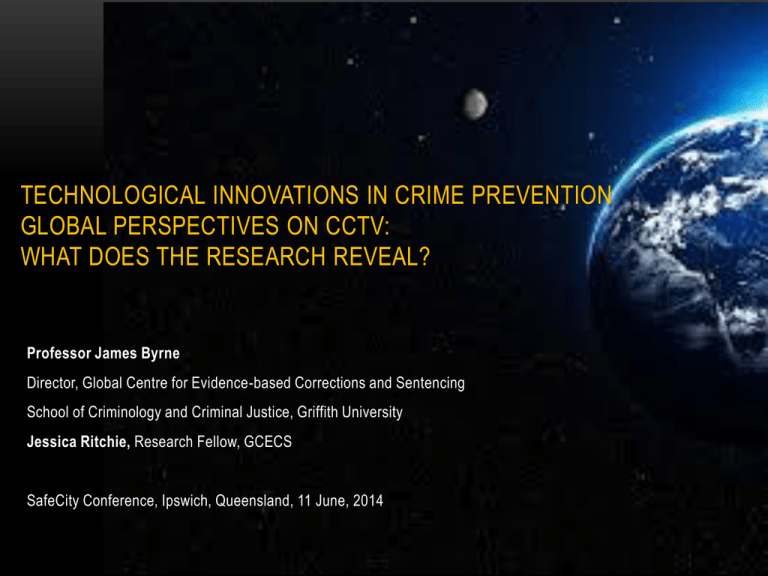
TECHNOLOGICAL INNOVATIONS IN CRIME PREVENTION GLOBAL PERSPECTIVES ON CCTV: WHAT DOES THE RESEARCH REVEAL? Professor James Byrne Director, Global Centre for Evidence-based Corrections and Sentencing School of Criminology and Criminal Justice, Griffith University Jessica Ritchie, Research Fellow, GCECS SafeCity Conference, Ipswich, Queensland, 11 June, 2014 (1) High Quality Corrections and Sentencing Research Agenda- the Centre will develop research projects focusing on evaluating the impact of current corrections and sentencing strategies (adult/juvenile) in Queensland, throughout Australia, and internationally. (2) Knowledge Exchange Seminars and Systematic, Evidence -based Policy Reviews -To translate research into practice, the Centre will develop a series of executive session seminars and workshops highlighting corrections and sentencing issues in each global region. (3) Global Evidence-based Corrections and Sentencing Network Development : The Centre—through the Centre’s state of the art website-- will become a global clearinghouse for high quality, evidence-based corrections research, and a primary source of information on global corrections performance, and innovative corrections and sentencing policies and practices . WEBPAGE: WWW.GCECS.EDU.AU PRESENTATION OVERVIEW • New Technology of Crime Prevention: CCTV in Global Context • Impact of New Technology: Global Research Review • The Future of CCTV: Three Issues To Consider CCTV APPLICATIONS AROUND THE GLOBE • CCTV in the United States • CCTV In UK and Europe • CCTV in China • CCTV in Australia THE NEW TECHNOLOGY OF CRIME PREVENTION: CCTV APPLICATIONS • Hard Technology • Soft Technology • CCTV & police • Gunshot location & CCTV • CCTV & private sector • Facial recognition & CCTV • CCTV & public sector • Flash mobs & CCTV • CCTV & street lighting DOES CCTV TECHNOLOGY REDUCE CRIME? Four Research Issues to consider: 1. Research on the reliability of the technology? 2. Training on the use of technology? 3. Research on the impact of the technology on key outcome measures? 4. Cost effectiveness of technology acquisition? EVIDENCE OF IMPACT OF CCTV TECHNOLOGY ON CRIME • National Research Council review of police performance (2004) in the United States revealed that there was no evidence of improved performance linked to recent police innovations, including CCTV (and other recent innovations). • Campbell Collaborative Evidence-Based Review of CCTV by Welsh and Farrington (2008) revealed selected crime prevention effects, which varied within and across global regions. • Our review of the recent research underscores the need for quality research that is high quality and Australia-based. WELSH, B.C. & FARRINGTON, D.P. (2008). EFFECTS OF CLOSED CIRCUIT TELEVISION SURVEILLANCE ON CRIME. CAMPBELL SYSTEMATIC REVIEW. Location UK US Sweden Norway Canada Total City and Town Centres 17 3 1 1 - 22 Public Housing 7 2 - - - 9 Public Transport 3 - - - 1 4 Car Parks 6 - - - - 6 Other Settings 3 - - - - 3 44 CCTV EVALUATIONS OF CITY AND TOWN CENTRES Brown (1995) Brown (1995) Sarno (1996) Skinns (1998) Squires (1998) Armitage (1999) Ditton (1999) Sarno (1999) Sarno (1999) Sarno (1999) Newcastle-Upon-Tyne UK Birmingham UK London Borough of Sutton UK Doncaster UK Ilford UK Burnley UK Airdrie UK London Borough of Southwark (Elephant and Castle) UK Undesirable effect. Some displacement and diffusion occurred. Desirable effect. Displacement occurred. Undesirable effect. Displacement/diffusion not measured. Desirable effect. No displacement occurred. Desirable effect. Displacement occurred. Desirable effect. Diffusion occurred. Desirable effect. Diffusion occurred. Null effect. Possible evidence of diffusion. London Borough of Southwark (Camberwell) UK London Borough of Southwark (East Street) UK Desirable effect. No displacement occurred. Uncertain effect. No diffusion; possible functional displacement occurred. CCTV EVALUATIONS OF CITY AND TOWN CENTRES Mazerolle (2002) Mazerolle (2002) Mazerolle (2002) Blixt (2003) Sivarajasingam (2003) Winge (2003) Gill (2005) Gill (2005) Gill (2005) Gill (2005) Farrington (2007a) Griffiths (no date) Cincinnati (Northside) US Cincinnati (Hopkins Park) US Cincinnati (Findlay Market) US Malmö (Möllevångstorget or Möllevång Sqaure) Sweden Null effect. Little or no displacement occurred. Null effect. Displacement/diffusion not measured. Null effect. Some displacement occurred. Desirable effect. No displacement occurred. Multiple city and town centres UK Oslo Norway Borough Town UK Market Town UK Shire Town UK South City UK Cambridge UK Gillingham UK Undesirable effect. Displacement/diffusion not measured. Undesirable effect. No displacement occurred. Desirable effect. No displacement occurred. Undesirable effect. No displacement occurred. Desirable effect. No displacement occurred. Null effect. No displacement occurred. Undesirable effect. Displacement/diffusion not measured. Desirable effect. Displacement/diffusion not measured. CCTV EVALUATIONS OF PUBLIC HOUSING Musheno (1978) Bronxdale Houses New York City US Uncertain effect. Displacement/diffusion not measured. Williamson (2000) Brooklyn New York US Null effect. Displacement and diffusion did not occur. Hood (2003) Greater Easterhouse Housing Estate Glasgow UK Desirable effect. Displacement/diffusion not measured. Gill (2005) Deploy Estate UK Undesirable effect. No displacement occurred. Gill (2005) Dual Estate UK Uncertain effect. No displacement occurred. Gill (2005) Southcap Estate UK Undesirable effect. Displacement/diffusion not measured. Gill (2005) Eastcap Estate UK Uncertain effect. No displacement occurred. Gill (2005) Northern Estate UK Desirable effect. No displacement occurred. Gill (2005) Westcap Estate UK Desirable effect. Displacement/diffusion not measured. CCTV EVALUATIONS OF PUBLIC TRANSPORT Burrows (1979) “Underground” subway London UK Desirable effect. Some displacement occurred. Webb (1992) “Underground” subway London UK Desirable effect. Diffusion occurred. Webb (1992) Oxford Circus station “Underground” subway UK Undesirable effect. Displacement/diffusion not measured. Grandmaison (1997) “Metro” subway Montreal Canada Null effect. Displacement/diffusion not measured. CCTV EVALUATIONS OF CAR PARKS Poyner (1991) University of Surrey Guildford UK Undesirable effect. Diffusion occurred. Tilley (1993) Hartlepool UK Desirable effect. Displacement occurred. Tilley (1993) Bradford UK Desirable effect. Displacement/diffusion not measured. Tilley (1993) Coventry UK Desirable effect. Displacement/diffusion not measured. Sarno (1996) London Borough of Sutton UK Desirable effect. Displacement/diffusion not measured. Gill (2005) Hawkeye UK Desirable effect. Displacement/diffusion not measured. CCTV EVALUATIONS IN OTHER SETTINGS Gill (2005) City Outskirts (residential area) UK Desirable effect. No displacement occurred. Gill (2005) Borough (residential area) UK Undesirable effect. No displacement occurred. Gill (2005) City Hospital UK Desirable effect. No displacement occurred. CCTV EVALUATIONS OF PUBLIC SPACE (POST WELSH & FARRINGTON) Ratcliffe & Taniguchi (2008) Philadelphia PA, Ratcliffe, Taniguchi, & Taylor US (2009) Reduction in crime but there were sites that showed decrease and others with no impact. Caplan, Kennedy, & Petrossian (2011) Newark, NJ US Statistically significant reduction in auto thefts, no significant displacement, small diffusion of benefits. Park, Oh, & Paek (2012) South Korea Reduction in number of robberies and thefts in areas with CCTV installed, no displacement effect found. McLean, Worden, & Kim (2013) Schenectady New York US Suggested that cameras have had effects on crime, and visibility of cameras is associated with its impact on crime and disorder. Cerezo (2013) Spain No significant reduction in crime and there was a small increase in crime to suggest displacement for property crimes (not crimes against the person). Lim, Kim, Eck, & Kim (2013) South Korea No statistically significant reduction in crime or disorder, but depends on the location. Results showed diffusion of benefits were higher in serious crimes than in disorder crimes. ASSESSING THE IMPACT OF CCTV TECHNOLOGY ON CRIME AND JUSTICE: THREE CRITICAL ISSUES TO CONSIDER IN AUSTRALIA 1. Is CCTV a technology in search of a program? 2. Why have high quality evaluation of CCTV systems in Australia not been completed to date? 3. Does Australia need to conduct its own RCT of the impact of CCTV on crime? Contact information Professor James Byrne James.Byrne@griffith.edu.au Jessica Ritchie J.Ritchie@griffith.edu.au
